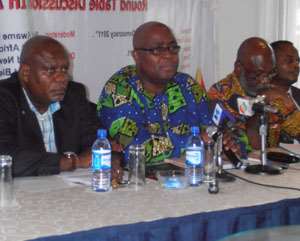
THE NATIONAL Commission for Civic Education (NCCE) has warned the public to stop patronizing irresponsible newspapers and radio stations that practice unripe journalism.
It is optimistic that the only means to discourage media outlets from engaging in reckless practices is for the public to avoid irresponsible TV/radio stations and newspapers.
The NCCE issued the statement during a roundtable discussion on the Media in Ghana in Accra on Tuesday.
The discussion formed part of activities marking the commission's 11 th Annual National Constitution Week Celebrations which was on the theme, 'The State of Ghana's Democracy, 2011.'
Prof. Kwame Karikari, Executive Director of Media Foundation for Africa, one of the participants who set the tone, explained that there is no monopoly in a democratic system adding that democracy allows everything unless there is a law against it.
He stressed that since there is currently no law preventing irresponsible journalism, it behooves the public to assist the National Media Commission to clear the system of irresponsible newspapers and radio programmes.
Prof. Karikari noted that media pluralism is also another means of controlling irresponsible journalism.
According to him, as a result of the global economy and IT, it is the responsibility of parents to guard their children along the right path by recommending the right newspapers and radio programmes for them.
Bright Blewu, the General Secretary of the Ghana Journalist Association (GJA) in an interview with DAILY GUIDE after the discussion, noted that most electronic and print media are retrogressing as a result of irresponsible journalism.
'So we need to ask ourselves why the circulation or patronage is going down. If about 2,000 people were listening to your programme and now you realise that adverts are not coming in and you are not getting sponsors you should know that people are no longer interested in your stories, hence the need for you to adjust yourself.'
Mr. Blewu therefore stressed the need for some print and electronic media outlets to merge in order to face the current challenges.
According to him, broadcasting legislation is very important to strengthen the media path.
Mr. Blewu as well called for a delayed broadcasting system to help electronic media monitor and screen people who call into their programmes.
Ben Ephson, Managing Editor of Daily Dispatch was of the view that although democracy and media freedom is good, it needs to be checked and controlled.
He condemned the recent phone-in programmes that allow people to say all sort of things unedited.
'It is time for licenses to be withdrawn from media stations that shirk their responsibilities,' he said.
David Newton, Director, Ghana Institute of Journalism emphasised that there is a need for our democratic system to be protected.
According to him, since the Ghanaian democratic as well as political systems are not matured enough, 'we should do everything to protect it'.
By Stella Danso Addai




 Burkina Faso expels French diplomats for 'subversive activities'
Burkina Faso expels French diplomats for 'subversive activities'
 GOIL reduces petrol price by 29 pesewas, sells GHC14.70 per litre
GOIL reduces petrol price by 29 pesewas, sells GHC14.70 per litre
 The disrespect towards security is terrible; we can do better — Atik Mohammed co...
The disrespect towards security is terrible; we can do better — Atik Mohammed co...
 Starlink to cease connection in Ghana, other “unavailable” countries on April 30...
Starlink to cease connection in Ghana, other “unavailable” countries on April 30...
 MMCEs, DCEs and Regional Ministers must be elected to reduce political interfere...
MMCEs, DCEs and Regional Ministers must be elected to reduce political interfere...
 National Cathedral: ‘Nonsense; you take taxes from broke Ghanaians to dig a clum...
National Cathedral: ‘Nonsense; you take taxes from broke Ghanaians to dig a clum...
 April 18: Cedi sells at GHS13.59 to $1, GHS13.01 on BoG interbank
April 18: Cedi sells at GHS13.59 to $1, GHS13.01 on BoG interbank
 We must harness the collective power and ingenuity of female leaders to propel o...
We must harness the collective power and ingenuity of female leaders to propel o...
 Saglemi Housing Project will not be left to rot – Kojo Oppong Nkrumah
Saglemi Housing Project will not be left to rot – Kojo Oppong Nkrumah
 Asantehene commends Matthew Opoku Prempeh for conceiving GENSER Kumasi Pipeline ...
Asantehene commends Matthew Opoku Prempeh for conceiving GENSER Kumasi Pipeline ...
